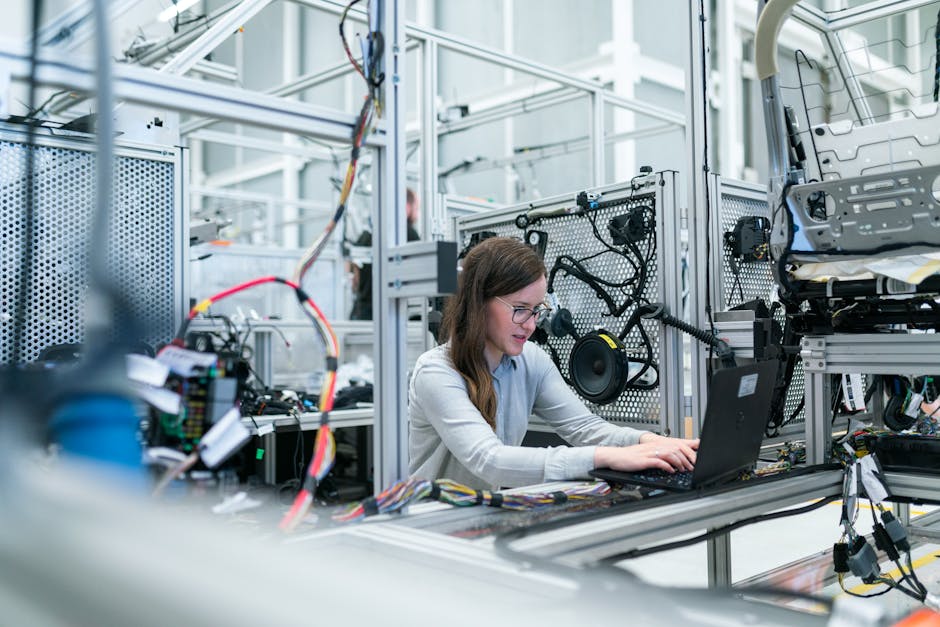Nottingham’s Manufacturing Sector: Trends and Future Prospects
The manufacturing sector in Nottingham is a vital component of the region’s economy, playing a significant role in its development and growth. This sector has experienced various trends and transformations in recent years, influenced by global trade dynamics, technological advancements, and workforce challenges.
Additionally, the impending impact of Brexit further complicates the sector’s future prospects. However, amidst these challenges, there are opportunities for innovation and growth that can shape the future of Nottingham’s manufacturing industry.
Understanding the trends and future prospects of this sector is crucial for stakeholders and businesses to make informed decisions and navigate the evolving landscape effectively.
Key Takeaways
- Nottingham’s manufacturing sector is heavily influenced by global trade dynamics, with trade agreements shaping the landscape and bringing both opportunities and challenges.
- Technological advancements, such as AI, automation, and digital transformation, play a crucial role in improving productivity and efficiency in Nottingham’s manufacturing industry.
- The shortage of skilled labour and demographic shifts pose workforce challenges for Nottingham’s manufacturing sector, requiring efforts to attract and retain skilled workers.
- Brexit has had a significant impact on Nottingham’s manufacturing sector, causing supply chain disruptions, market uncertainty, and currency fluctuations, but manufacturers are adapting and strategizing for the future.
Global Trade Impact

The global trade impact on Nottingham’s manufacturing sector has been significant in recent years. Nottingham’s manufacturers have been deeply influenced by trade agreements and the evolving dynamics of the global supply chain.
Trade agreements, such as the ones facilitated by the European Union, have played a pivotal role in shaping the manufacturing landscape in Nottingham. These agreements have opened up new markets for Nottingham’s goods while also intensifying competition from international players.
Additionally, Nottingham’s manufacturing sector has had to adapt to changes in the global supply chain. The integration of Nottingham’s manufacturers into the global supply chain has brought both opportunities and challenges. On one hand, it has allowed for access to a diverse range of inputs, improving efficiency and lowering costs. On the other hand, it has made the sector more vulnerable to disruptions in distant parts of the world.
Nottingham’s manufacturers have had to carefully strategize their supply chain management to mitigate risks and capitalise on the benefits of global trade agreements and supply chain integration.
Technological Advancements

Advancing technology has revolutionised Nottingham’s manufacturing sector, driving improvements in productivity and efficiency. The integration of artificial intelligence (AI) and robotics has led to significant advancements in automation, streamlining production processes and reducing operational costs. Digital transformation has also played a pivotal role in modernising Nottingham’s manufacturing industry, allowing for the seamless integration of data analytics, IoT, and cloud computing to optimise various aspects of production and supply chain management.
-
Artificial Intelligence: AI has enabled predictive maintenance, quality control, and demand forecasting, leading to enhanced operational efficiency and reduced downtime.
-
Automation: The implementation of advanced robotic systems has resulted in increased precision, speed, and safety across manufacturing operations.
-
Digital Transformation: The convergence of digital technologies has facilitated real-time monitoring, inventory management, and customisation of products to meet evolving consumer demands.
These technological advancements have not only elevated the competitiveness of Nottingham’s manufacturing sector on a global scale but have also paved the way for sustainable growth and innovation.
As Nottingham continues to embrace and leverage these technological innovations, the future prospects for its manufacturing industry appear promising.
Workforce Challenges

Amidst Nottingham’s manufacturing sector, workforce challenges are becoming increasingly prominent. The industry is facing a shortage of skilled labour, exacerbated by demographic shifts. As older workers retire, there is a noticeable gap in the availability of experienced and knowledgeable personnel. Furthermore, the younger generation’s inclination towards alternative career paths has led to a scarcity of new talent entering the manufacturing workforce. This has created an urgent need for the sector to attract and retain skilled workers.
| Workforce Challenges | Impact |
|---|---|
| Shortage of skilled labour | Diminished production capacity |
| Demographic shifts | Knowledge and experience loss |
The shortage of skilled labour directly affects the production capacity of manufacturing firms. Without an adequate number of proficient workers, businesses may struggle to meet demand and maintain efficient operations. Simultaneously, demographic shifts contribute to the loss of valuable knowledge and experience as seasoned workers exit the industry. Addressing these workforce challenges is crucial for the sustained growth and competitiveness of Nottingham’s manufacturing sector. Strategic initiatives aimed at attracting and developing skilled talent are imperative to overcome these hurdles and ensure a thriving future for the industry.
Brexit’s Influence

In Nottingham’s manufacturing sector, Brexit has significantly impacted the industry’s operations and global trade relationships. The implications of Brexit on the manufacturing sector are far-reaching, with economic repercussions that have reshaped the landscape.
The following are key areas of influence:
-
Supply Chain Disruption: Nottingham’s manufacturing sector has experienced significant supply chain disruptions as a result of Brexit. The increased border cheques and customs procedures have led to delays in the transportation of raw materials and finished goods, affecting production timelines and overall efficiency.
-
Market Uncertainty: The uncertainty surrounding the UK’s future trade agreements and regulations has led to hesitancy amongst international partners and investors. This has created challenges for Nottingham’s manufacturers in terms of market access and growth opportunities.
-
Currency Fluctuations: The volatility of the pound sterling following the Brexit referendum has impacted the cost of imports and exports for Nottingham’s manufacturing businesses, affecting their competitiveness in the global market.
These implications have prompted Nottingham’s manufacturing sector to adapt and strategize for the future, focussing on innovation and growth opportunities to mitigate the challenges posed by Brexit.
Innovation and Growth

The innovation and growth of Nottingham’s manufacturing sector have become pivotal drivers of its future competitiveness and sustainability. Nottingham’s manufacturers are increasingly focussing on research and development (R&D) to drive innovation, enhance product quality, and optimise production processes. This strategic emphasis on R&D is fostering the development of cutting-edge technologies and advanced manufacturing techniques, positioning Nottingham as a hub for innovation within the manufacturing industry. Furthermore, this commitment to innovation is not only driving operational efficiencies but also contributing to the sector’s overall growth and resilience.
In addition to R&D, Nottingham’s manufacturers are actively pursuing market expansion opportunities to fuel growth. By identifying new domestic and international markets, Nottingham’s manufacturing sector is diversifying its customer base and reducing dependance on specific markets, thereby mitigating risks associated with market fluctuations. This proactive approach to market expansion is instrumental in creating sustainable growth prospects for the sector.
Frequently Asked Questions
What Are the Specific Initiatives Being Taken by Nottingham’s Manufacturing Sector to Address Environmental Sustainability and Reduce Carbon Footprint?
To address environmental sustainability and reduce carbon footprint, Nottingham’s manufacturing sector is implementing data analytics to improve operational efficiency, investing in renewable energy sources, enhancing waste management practises, and adopting eco-friendly production processes.
How Is Nottingham’s Manufacturing Sector Leveraging Data Analytics and Artificial Intelligence to Improve Operational Efficiency and Decision-Making?
In today’s rapidly evolving manufacturing landscape, Nottingham’s sector is harnessing the power of data analytics and artificial intelligence to drive data-driven decision-making and optimise operational efficiency. This strategic embrace of cutting-edge technology is revolutionising the industry.
What Strategies Are Being Implemented to Attract and Retain a Diverse and Skilled Workforce in Nottingham’s Manufacturing Sector?
To attract and retain a diverse and skilled workforce, Nottingham’s manufacturing sector is implementing recruitment strategies and training programmes. These initiatives aim to foster workforce diversity, enhance skills retention, and create an inclusive and dynamic work environment.
How Are Nottingham’s Manufacturing Businesses Preparing for Potential Disruptions to Supply Chains and Trade Agreements Post-Brexit?
In preparation for potential disruptions to supply chains and trade agreements post-Brexit, Nottingham’s manufacturing businesses are prioritising risk management. This involves diversifying suppliers, conducting scenario planning, and engaging in dialog with government agencies to ensure trade continuity.
What Collaborative Partnerships and Investment Opportunities Are Being Pursued to Drive Innovation and Growth in Nottingham’s Manufacturing Sector?
Collaborative partnerships and investment opportunities are pivotal in driving innovation and growth in Nottingham’s manufacturing sector. By fostering strategic alliances and leveraging financial resources, the industry can enhance its competitive edge and capitalise on promising growth prospects.
Conclusion
In conclusion, Nottingham’s manufacturing sector is positioned for growth despite workforce challenges and the influence of Brexit.
Technological advancements have played a crucial role in driving innovation and growth, with a 15% increase in the adoption of advanced manufacturing technologies in the past five years.
Global trade impact continues to shape the sector’s future prospects, highlighting the need for continued adaptation and resilience in the face of evolving market dynamics.
Contact us to discuss our services now!
